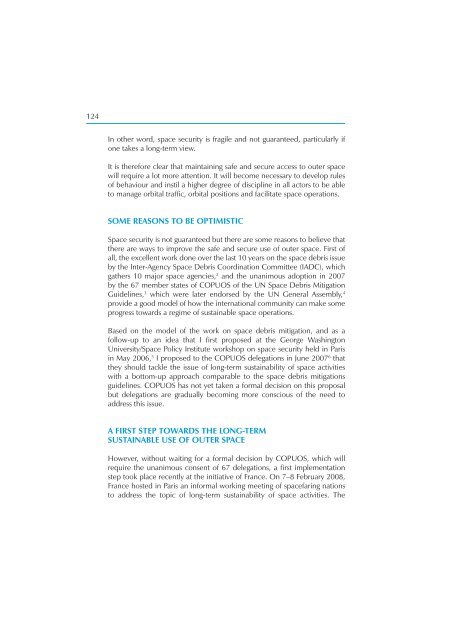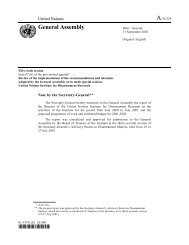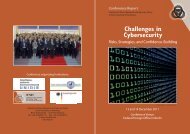Security in Space The Next Generation - UNIDIR
Security in Space The Next Generation - UNIDIR
Security in Space The Next Generation - UNIDIR
Create successful ePaper yourself
Turn your PDF publications into a flip-book with our unique Google optimized e-Paper software.
124<br />
In other word, space security is fragile and not guaranteed, particularly if<br />
one takes a long-term view.<br />
It is therefore clear that ma<strong>in</strong>ta<strong>in</strong><strong>in</strong>g safe and secure access to outer space<br />
will require a lot more attention. It will become necessary to develop rules<br />
of behaviour and <strong>in</strong>stil a higher degree of discipl<strong>in</strong>e <strong>in</strong> all actors to be able<br />
to manage orbital traffi c, orbital positions and facilitate space operations.<br />
SOME REASONS TO BE OPTIMISTIC<br />
<strong>Space</strong> security is not guaranteed but there are some reasons to believe that<br />
there are ways to improve the safe and secure use of outer space. First of<br />
all, the excellent work done over the last 10 years on the space debris issue<br />
by the Inter-Agency <strong>Space</strong> Debris Coord<strong>in</strong>ation Committee (IADC), which<br />
gathers 10 major space agencies, 2 and the unanimous adoption <strong>in</strong> 2007<br />
by the 67 member states of COPUOS of the UN <strong>Space</strong> Debris Mitigation<br />
Guidel<strong>in</strong>es, 3 which were later endorsed by the UN General Assembly, 4<br />
provide a good model of how the <strong>in</strong>ternational community can make some<br />
progress towards a regime of susta<strong>in</strong>able space operations.<br />
Based on the model of the work on space debris mitigation, and as a<br />
follow-up to an idea that I fi rst proposed at the George Wash<strong>in</strong>gton<br />
University/<strong>Space</strong> Policy Institute workshop on space security held <strong>in</strong> Paris<br />
<strong>in</strong> May 2006, 5 I proposed to the COPUOS delegations <strong>in</strong> June 2007 6 that<br />
they should tackle the issue of long-term susta<strong>in</strong>ability of space activities<br />
with a bottom-up approach comparable to the space debris mitigations<br />
guidel<strong>in</strong>es. COPUOS has not yet taken a formal decision on this proposal<br />
but delegations are gradually becom<strong>in</strong>g more conscious of the need to<br />
address this issue.<br />
A FIRST STEP TOWARDS THE LONG-TERM<br />
SUSTAINABLE USE OF OUTER SPACE<br />
However, without wait<strong>in</strong>g for a formal decision by COPUOS, which will<br />
require the unanimous consent of 67 delegations, a fi rst implementation<br />
step took place recently at the <strong>in</strong>itiative of France. On 7–8 February 2008,<br />
France hosted <strong>in</strong> Paris an <strong>in</strong>formal work<strong>in</strong>g meet<strong>in</strong>g of spacefar<strong>in</strong>g nations<br />
to address the topic of long-term susta<strong>in</strong>ability of space activities. <strong>The</strong>








